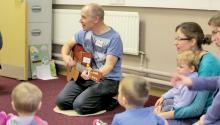Early this past October, I sat with a cup of peppermint tea in a church in the small town of Cobridge, England. The church had four walls, long windows and high ceilings. In place of pews, however, I sat on a well-worn second-hand couch. As I looked around, I found toy boxes where the pulpit might be and family photos in place of an altar.
The smell of homemade pizza wafted from the kitchen, where our hosts were preparing a true feast for us that evening. Looking around that space, my mind began to open as I considered what a church looks like. Is this living room that I find myself in, in a complete stranger’s home, truly church?
This was one of many questions that arose during a week-long learning excursion that eight young adults embarked upon, along with Jeff Steckley, Mennonite Church Eastern Canada’s congregational ministries minister. On Oct. 4, we caught a flight to London, to explore Urban Expression (UE), a ministry rooted in Anabaptist theology and focussed on bringing creative and relevant expressions of the Christian church in under-churched areas of the inner city.
In the fast-paced world we live in, churches are facing new realities and challenges. It can be hard to know how to respond, yet UE is rising to that task. Their teams are deeply dedicated to living out Jesus’ teachings. UE values humility, creativity and relationship, and believes in the importance of community, hospitality and simple living. It sounded so familiar to me. Are these not the very same values that I’ve grown up with as a Mennonite?
Over the course of that week, we were hosted by four different UE teams. Between the neighbourhood walking tours, where community gardens flourished and abandoned playgrounds showed signs of revitalization, to the meals of jellied eel and fresh baked bread shared around tables, and conversations about everything from church-planting to pottery, I made three distinct observations about UE:
• The success of church is not measured by the number of people who attend. Rather, it is measured by the quality of relationships that are formed. For UE, church is not just a place or a time; it is an expression to be lived out every day for those around us. Church can look like anything from cleaning the trash from alleyways and sharing community meals, to leading parenting seminars or rebuilding playgrounds.
• Food and sharing meals are foundational to living out UE values. In the short time we spent with them, hospitality and generosity were most prominently expressed through food. Barriers broke down as we sat in cafés, kitchens and dining rooms.
“A theme that runs through all the different types of gathering is food,” UE founder Juliet Kilpin writes in her book Urban to the Core. “We have found that eating together and developing relationships and community seem to go hand in hand.” It was powerful to find such importance placed on something so easily overlooked.
• Those serving with UE had a glow about them. Every person connected to UE exuded peace and joy. The work that UE does is not easy. The areas they live in are often overpopulated, ethnically and spiritually diverse, and economically disadvantaged, and their mission requires them to break out of comfort zones to extend love and forgiveness no matter how difficult. Despite the challenges, I was overwhelmed by the outpouring of love on us as visitors, and on the communities that these UE participants live in and serve.
I believe that there is much that Canadian Mennonites can learn from groups like UE. We already share common ground in our foundational values. Mutual beliefs in the tenets of Anabaptism bind us to groups like UE in powerful ways. Many of us are already hard at work, investing in our communities and finding ways to live out our Anabaptist beliefs.
Since my visit with UE, I have felt challenged to push myself further; seek new and creative ways to engage in the community I find myself in; expand my comfort zone; and to not just attend church, but to be church on a daily basis in some way, even if it is just over a cup of peppermint tea in the living room of a stranger.
Ellery Penner, 23, lives in Niagara-on-the-Lake, Ont., where she is a member of Niagara United Mennonite Church.

The trip to England included a walking tour of Tower Hamlets, the original community in which Urban Expression is located.

Humpty Dumpty Club, a weekly music and playtime for toddlers and their parents, is one of the many avenues Urban Expression uses to connect with the local community.

Photo courtesy of Ellery Penner
Ellery Penner was one of eight young adults from Mennonite Church Eastern Canada that travelled to England this past October to learn about Urban Expression, an Anabaptist ministry focused on bringing creative and relevant expressions of the Christian church in under-churched areas of the inner city.


Add new comment
Canadian Mennonite invites comments and encourages constructive discussion about our content. Actual full names (first and last) are required. Comments are moderated and may be edited. They will not appear online until approved and will be posted during business hours. Some comments may be reproduced in print.